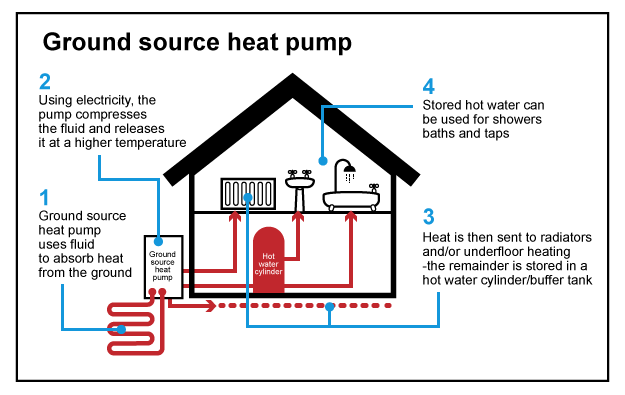CALL US ON: 01269 850224
A heat pump is a device that extracts heat from the air or ground and transfers it into energy that's suitable to provide comfortable heating and hot water to almost any building. 
What are the main types of Heat Pumps?
There are three main types of heat pump: air source heat pumps, ground source heat pumps and water source heat pumps.
A GSHP is an energy efficient, renewable energy solution that is particularly suited to properties on larger plots. They are units which are installed inside a property or in an external plant room and they circulate heat from the ground and raise its temperature before distributing the heat to provide hot water and space heating via radiators, underfloor heating or fan coil units. They are powered by electricity and are a clean and combustion free technology which doesn't use fossil fuels helping to reduce your carbon footprint and even lower your energy bills.

The benefits of a ground source heat pump
The benefits of a Heat Pump
Installing a heat pump in a building brings a variety of financial and environmental benefits. Unlike conventional boilers, heat pumps don’t require burning fossil fuels to create heat. All the thermal energy produced comes directly from natural, renewable sources. This means property owners can benefit from:
DOES MY PROPERTY NEED TO BE WELL INSULATED TO HAVE A HEAT PUMP?
Insulation should be up to modern Building Regulation standards to ensure the heat pump both effectively and efficiently heats the property.
DO HEAT PUMPS WORK IN COLD WEATHER?
Yes. Heat pumps work effectively year-round. The top 15m of the Earth’s surface maintains an average year-round temperature of 12ºC. Ground source heat pumps (GSHPs) use this heat source to supply the energy required to heat domestic water, and a low temperature heating system such as underfloor heating. Air source heat pumps work in a similar way, except they extract available warmth from passing air rather than from the ground. In theory they should be able to extract useful energy from the outside air down to temperatures as low as -15°C. The storage cylinder provides both domestic hot water and a boost of heating energy in the coldest weather.
CAN I USE MY HEAT PUMP 24 HOURS A DAY?
Yes, absolutely. It’s the most efficient way.
ARE AIR SOURCE HEAT PUMPS NOISY?
No, most air source heat pumps are no louder than a fridge/freezer or dishwasher. Even if you need to install your heat pump near your outdoor sitting area you’re less likely to use this space during the winter when the heat pump is running more often.
WHAT IS THE COST OF INSTALLING A HEAT PUMP?
When installing a heat pump, there isn’t a simple one-off cost. There are different aspects of the installation that need to be considered and factored into a quote.
WHAT IS THE LIFESPAN OF A HEAT PUMP?
This can vary greatly, dependant on the level of use and how regularly it is checked and serviced. Heat pumps should be serviced annually, with some commercial systems requiring bi-annual servicing arrangements. Generally, the lifespan of a heat pump is expected to be around 20-25 years.
WHICH IS BETTER AN ASHP OR A GSHP?
It is essential that you have sufficient external space for the installation of a GSHP, which tends to rule out most urban properties. With regards to cost, the difference between a GSHP and an ASHP is comparative but with the groundworks and the costs associated, costs can be significant. There are 'right' and 'wrong' solutions for each project and they should be assessed individually.
CAN A HEAT PUMP PRODUCE HOT WATER?
Yes a heat pump can produce adequate domestic hot water for all normal use. Generally, we recommend to heat a hot water cylinder to 45 - 50°c. This is warm enough for all washing and bathing. We try to encourage customers to find a happy medium, as the golden rule with all heat pump systems is to keep the output temperature as low as possible while maintaining comfort. Over 50°c normally means that you would need to turn the cold tap on to cool the water, it makes no sense to heat the water and to then cool it at point of use.